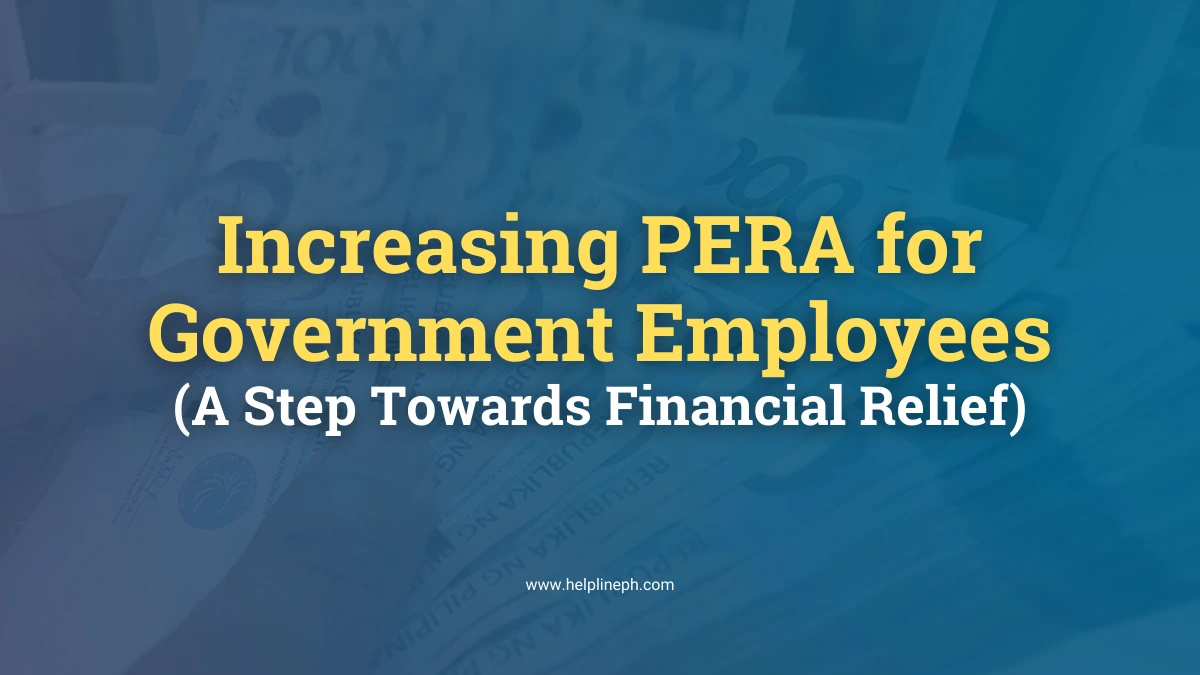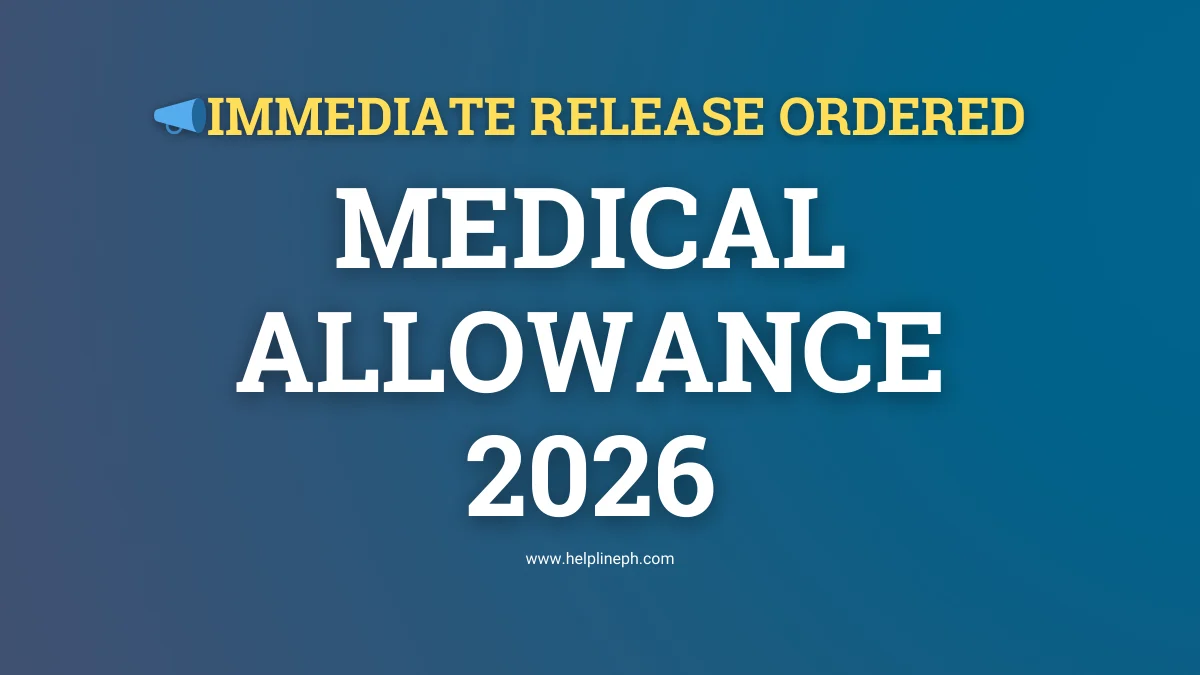Senator Raffy T. Tulfo recently introduced a new bill to the Philippine Senate that aims to increase the Personnel Economic Relief Allowance (PERA) for government employees. With the rising cost of living, this proposal comes at a critical time for many public servants. PERA is a monthly financial allowance meant to help government workers cope with inflation and increasing daily expenses.
What is PERA?
PERA stands for Personnel Economic Relief Allowance. It is a monthly benefit given to government employees in the Philippines. The purpose of PERA is to help government workers manage the financial strain caused by inflation, which is the steady increase in the prices of goods and services over time. This allowance helps ensure that government employees can still afford basic necessities even when prices rise.
Why is Increasing PERA Important?
Inflation in the Philippines continues to drive up the cost of living. Essentials such as food, transportation, housing, and utilities have become more expensive, leaving many government employees struggling to keep up with these rising costs. Increasing the amount of PERA will give them the financial cushion they need to maintain their economic stability and continue providing for their families.
Many government employees, especially those in lower-paying positions, rely heavily on their salaries and allowances to make ends meet. Without additional support, they may face difficulties affording basic needs. By increasing PERA, the government can help reduce financial stress for public workers, allowing them to focus more on their jobs and duties without worrying as much about their financial situation.
Key Features of the Proposed Bill
The bill introduced by Senator Tulfo includes several important points aimed at improving the economic well-being of government employees. Here’s a breakdown:
1. Automatic Yearly Adjustment
One of the main features of the proposed bill is the automatic yearly adjustment of PERA. This means that the amount of PERA will increase each year in line with the country’s inflation rate. By doing this, the allowance will remain relevant and sufficient to cover rising costs over time. This automatic adjustment ensures that government employees won’t have to wait for new legislation to see an increase in their financial support.
2. Increase in PERA Amount
Currently, government employees receive P2,000 per month as PERA. The bill proposes increasing this to P4,000 per month, effectively doubling the amount of financial support they receive. This increase would make a significant difference in helping workers manage their daily expenses, especially in light of inflation.
3. Who Will Benefit?
The increased PERA will benefit all civilian government employees, including those working for both national and local governments. This applies whether the employee is in a regular, contractual, or casual position. However, government employees stationed abroad who receive overseas allowances are excluded from this increase, as they already receive additional compensation for their foreign assignments.
4. Funding for the Increase
For the first year of implementation, the additional funds for the PERA increase will come from government savings. These savings can include unused or surplus budget allocations. In the following years, the funds required to sustain the higher PERA will be included in the annual General Appropriations Act, ensuring that the increase is properly funded on a long-term basis.
5. Implementation Timeline
Once the bill is signed into law, the Department of Budget and Management (DBM) will have 15 days to issue the necessary rules and regulations for the proper implementation of the new PERA. This ensures that there is a clear and organized plan for rolling out the increased allowance to all eligible employees.
6. Repeal of Conflicting Laws
To ensure smooth implementation, any existing laws, decrees, or resolutions that conflict with this new bill will be repealed or amended. This helps prevent confusion and ensures that the new PERA adjustments are fully enforceable.
Why This Matters for Government Employees
For many government workers, PERA represents an essential part of their monthly income. The proposed increase will give them a much-needed boost, helping them keep up with rising costs, including food, housing, transportation, and other daily necessities. Additionally, the automatic yearly adjustment tied to inflation will provide them with ongoing financial security, as it ensures that PERA keeps pace with the rising cost of living.
Government employees work hard to provide essential services to the public, and giving them this financial relief can help improve their well-being and job performance. When workers are less stressed about their personal finances, they are likely to be more productive and satisfied with their work.
The Importance of Financial Support in Public Service
Providing financial support to government employees is not just about individual benefits; it’s about improving the overall efficiency and morale of the public sector. Public servants play a key role in the functioning of the government, and when they are financially secure, they can perform their duties more effectively.
An increase in PERA could also make government positions more attractive to skilled professionals, helping improve the quality of public services in the long run. By ensuring that employees are properly compensated, the government can foster a stronger, more motivated workforce.
Conclusion
The bill introduced by Senator Raffy Tulfo to increase the Personnel Economic Relief Allowance (PERA) for government employees is a timely and necessary measure. As inflation continues to rise, public sector workers need more financial support to maintain their standard of living. Doubling the PERA amount and introducing automatic yearly adjustments are critical steps to ensure that government employees receive fair compensation that keeps pace with the cost of living.
By providing this financial relief, the government can help secure the economic stability of its workers, improve their job satisfaction, and, ultimately, strengthen the overall public service. This measure benefits not only individual employees but also the country as a whole, as it ensures that government workers can continue to serve the public efficiently and effectively.
Frequently Asked Questions (FAQs)
What is the current amount of PERA for government employees?
The current PERA amount is P2,000 per month for government employees.
Who will benefit from the PERA increase?
The increase will benefit all civilian government employees, including regular, contractual, and casual workers in both national and local government offices.
How much is the proposed increase in PERA?
The bill proposes increasing PERA to P4,000 per month, doubling the current amount.
Will government employees abroad receive the PERA increase?
No, government employees stationed abroad who already receive overseas allowances are excluded from the PERA increase.
When will the new PERA take effect?
If the bill is passed into law, the Department of Budget and Management will issue rules for implementation within 15 days.






